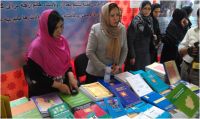 Dr Adela Mubasher from WHO Afghanistan, pictured here during an advocacy campaign event, received an award in recognition of her continuing technical support to reproductive health in Afghanistan
Dr Adela Mubasher from WHO Afghanistan, pictured here during an advocacy campaign event, received an award in recognition of her continuing technical support to reproductive health in Afghanistan
Kabul, 12 June 2013 – The Ministry of Public Health of Afghanistan has been running an advocacy and communication campaign on the Safe Motherhood Initiative in Afghanistan. In support of this WHO established a stand during one of the events displaying publications on reproductive, maternal, newborn and child health in Dari, Pashto and English.
Improvement of maternal and child health is among one of the top priority areas for the Ministry of Public Health, as outlined in their Health Care Sector Strategic Plan (2011–2015) and National Health and Nutrition Policy (2012–2020).
Several factors could reduce the risks that pregnant women in Afghanistan face, these include: providing access to, and use of, maternal and reproductive health services; addressing the cultural and social determinants that influence women's reproductive health outcomes; and encouraging greater health-seeking behaviour among women.
Many women living in rural areas in Afghanistan deliver babies at home without skilled birth assistance or proper referral services for essential and emergency obstetric care. The Ministry of Public Health has been expanding access to skilled reproductive health services for women, with a focus on the main components of maternal and newborn health, and implementing Integrated Management of Childhood Illness programme (IMCI) and birth spacing/family planning services, supported by UN agencies, donors and partner institutions.


